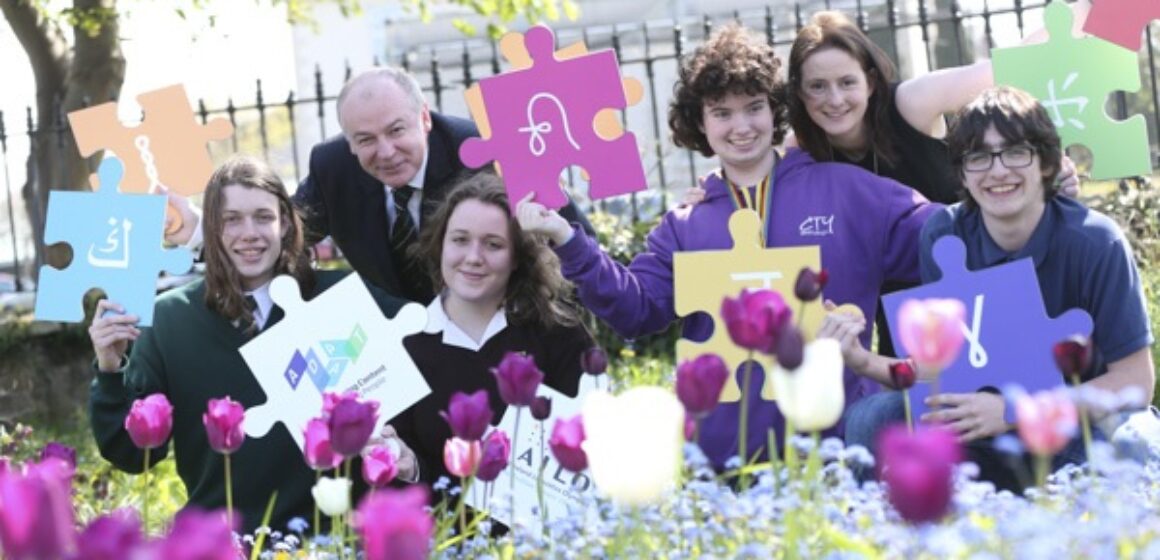Press Release: Ireland’s Top Young Problem Solvers to Take On World’s Best Decoders at International Linguistics Olympiad
Ireland’s top four secondary school decoders win the chance to represent their country at the International Linguistics Olympiad in Bulgaria

Four secondary school students from across the island of Ireland have been selected to test their language decoding skills against the world’s best at the International Linguistics Olympiad in Blagoevgrad, Bulgaria, in July. The students, from Dublin and Donegal, finished ahead of 120 opponents in the All Ireland Linguistics Olympiad (AILO) Finals, which were recently held at Dublin City University.
Run by the Science Foundation Ireland funded ADAPT Centre, the All Ireland Linguistics Olympiad (AILO) aims to inspire the next generation of multilingual technology graduates, who possess a combination of language competency and problem solving expertise.
Shmuel Barron of Sutton Park School (Dublin) was the overall winner of the individual competition. He will be joined in Bulgaria by fellow team members Luke Gardiner of Gonzaga College (Dublin), Ethan Hamman of Newpark Comprehensive (Dublin) and Niamh Lynch of Loreto Letterkenny (Donegal). Luke, Ethan and Niamh finished second, third and fourth respectively in the individual competition.
From a starting line-up of 4,000 students from 161 secondary schools that spanned 29 counties, the top 123 sleuths battled it out during individual and team contests at AILO. Competitors engaged in ‘code-breaking’ challenges to unlock information in unfamiliar languages. . This year’s individual contest included puzzles in Evenki (an inner Mongolian language), Murrinhpatha (an Australian indigenous language spoken by only 3000 people), and the Georgian writing system. No prior knowledge of a second language was required because even the hardest problems required only reasoning skills, logic and patience
Niamh Lynch is looking forward to pitting her wits against winners of other National Linguistics Olympiads during a week packed with puzzles and cultural experiences in Bulgaria in July. She said: “Partaking in AILO has been such a brilliant experience, and I’m thrilled to be representing Ireland in Bulgaria this summer.”
2015 saw the first Junior competition for AILO and the winner was Aleksandr Gusev of Royal School Cavan. Second and third places went to Vincent Wong or Cookstown High School and Alexander Harding of Maynooth Post Primary School.
In addition to the individual competition that put together the team heading to Bulgaria, there was also a team contest at AILO. The winning team was Gonzaga College (Dublin). Luke Gardiner was a part of this winning team along with Turlough Hannon, Daniel Mulcahy and Jonathan McGrath. The teams in this section of the competition tackled a crossnumber puzzle (similar to a crossword), identified ‘bots’ on an user review website, and tackled a problem in Maxakali (an Amazonian language spoken by as few as 1200 people).
Olympiad National Coordinator Dr. Cara Greene of ADAPT who will act as Team Leader in Bulgaria said, “The students who have qualified to represent Ireland are talented problem-solvers who will hold their own in Bulgaria at the International Olympiad. We are looking forward to competing against 30 teams from 22 countries from all over the World.”
In the multi-billion euro Content Technology sector, graduates are in very strong demand in Ireland and globally. Professor Vincent Wade, CEO of the ADAPT Research Centre at TCD and organisers of the All Ireland Linguistics Olympiad, said “The Olympiad is unique in how it fosters skills in lateral thinking, problem solving and communication which are key to 21st Century living”.
Finalists have received tuition from experts at the ADAPT Centre for Digital Content Technology, a €110 million academia-industry research centre developing advanced technology to adapt and personalise digital content and services to the needs of global users. They will receive further tuition before they leave to represent Ireland in the Finals in Bulgaria later this year.
Ends
NOTES FOR EDITORS
The All Ireland Linguistics Olympiad
Launched in 2009 and run by the ADAPT Centre, the All Ireland Linguistics Olympiad (AILO) is a contest in which secondary school students develop their own strategies for solving problems in fascinating languages from around the globe. Students must use their ingenuity to solve puzzles as deciphering Egyptian hieroglyphics, decoding numerical spy codes, and interpreting ancient Mayan poetry. No prior knowledge of linguistics or a second language is required, as even the hardest problems require only logical ability, patient work, and a willingness to think around corners. AILO introduces students to linguistics (i.e. the study of human language) and to the application of logic to problems of language understanding and translation. The goal is to develop students’ problem-solving skills and to inspire them to consider the fascinating range of careers at the intersection of computing, linguistics and language. More than 10,000 students have participated in the Olympiad to date, with many former participants now studying computing and linguistics and tutoring current participants. www.adaptcentre.ie/ailo
The International Linguistics Olympiad
The International Linguistics Olympiad is one of 12 International Science Olympiads for secondary school students, and has been held annually since 2003. Each year, teams of young linguists from more than 30 countries gather and test their minds against complex puzzles in language and linguistics. The weeklong Olympiad comprises individual and team contests, and students enjoy an active programme of social and cultural events. The 2015 edition of the contest will take place in Bulgaria in July 2015. www.ioling.org
ADAPT Centre
ADAPT is the global centre for digital content technology. Supported by Science Foundation Ireland, ADAPT combines the expertise of 120 researchers at four universities (Trinity College Dublin, Dublin City University, Dublin City University, University College Dublin and Dublin Institute of Technology) with that of its industry partners to produce ground-breaking digital content innovations. The Centre’s research and technologies help companies to deliver the right content, to the right customer at the right time, in the right language, in the right format and on the device of their choice. www.adaptcentre.ie
CONTACT
Dr. Cara Greene
National Coordinator, All Ireland Linguistics Olympiad
Research Outreach Coordinator
ADAPT Centre
Tel: +353 1 700 6704
Email: cgreene@computing.dcu.ie

